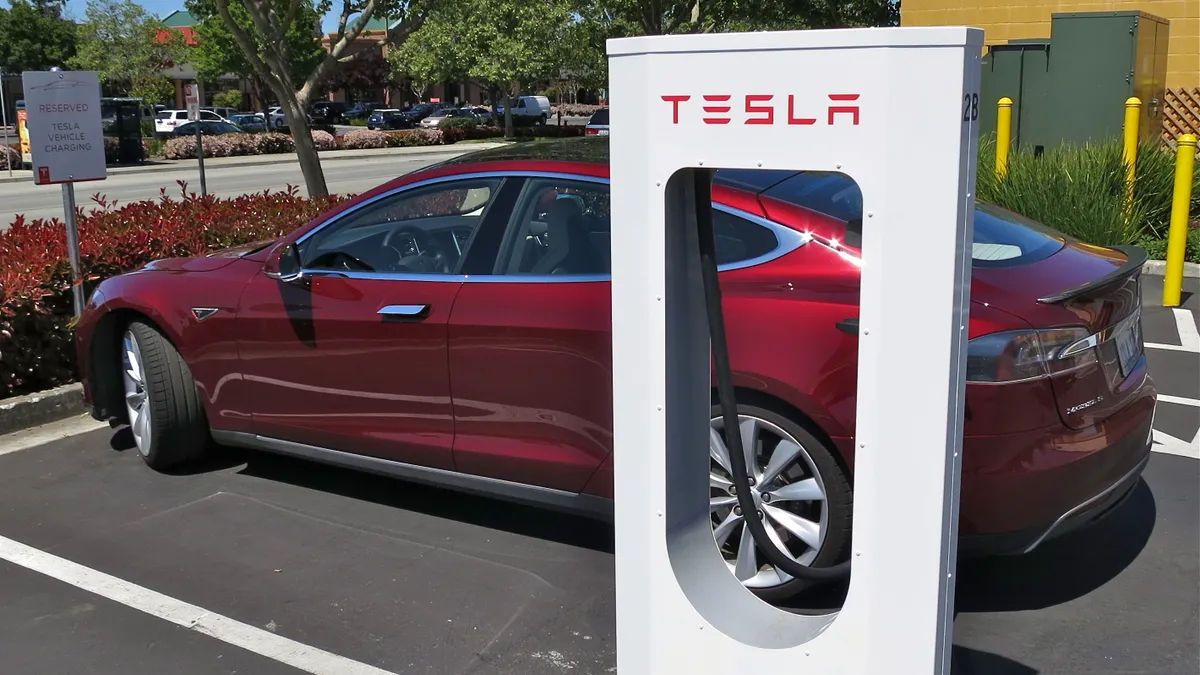Dive Brief:
- A coalition of utilities and electric transportation companies sued the Enviornmental Protection Agency earlier this month over its efforts to roll back automotive fuel efficiency standards set by the Obama administration.
- The suit, first reported by Axios, includes a dozen utilities, seven of which are Exelon or its subsidiaries. They asked the D.C. Circuit to review Trump's decision to reassess fuel economy standards from 2020 to 2026.
- The suit is another indication that utilities are beginning to lean into policy battles over electric vehicles. Last month, utilities helped defeat an anti-EV policy resolution at the American Legislative Exchange Council (ALEC), a conservative policymaking forum.
Dive Insight:
Electric vehicles are a key area of growth for electric utilities, many of which have seen their power demand stagnate or decline since the 2008 recession. Charging an EV, experts say, can double the electricity consumption of a small residential customer.
But EV proponents worry that efforts from the Trump administration to roll back fuel efficiency standards will slow the growth of electric vehicles.
Under Obama's fuel standards, light duty vehicles would have had to get 36 miles per gallon by 2025. The White House reviewed those rules in early 2017 before Trump took office, finding they were "technologically feasible," which is the standard set for industry regulations under the Clean Air Act.
The Trump EPA, however, withdrew that determination in April, saying past analyses were "optimistic" with respect to EV growth and technology advancement. The administration is now reportedly circulating a proposal that would freeze fuel standards after 2020.
The D.C. Circuit filing from utilities and transportation companies challenges that withdrawal. The group, called the National Coalition for Advanced Transportation, wants the federal appeals court to review the EPA's decision to revisit the standards.
The group is made up of 16 companies. Twelve are utilities, including Edison International, the Los Angeles Department of Water & Power, Pacific Gas & Electric, Portland General Electric, the Sacramento Municipal Utility District, Exelon and its subsidiaries Atlantic City Electric, Baltimore Gas & Electric, Commonwelath Edison, Delmarva Power, PECO and PEPCO.
The group also includes Tesla, EV truck-maker Workhorse and electric aviation company Ampaire.
The suit provides more evidence of a growing alliance between utilities and transportation companies on alternative fuel vehicles, as well as a widening divide with the oil industry.
In April, Duke Energy and the Edison Electric Institute joined forces with UPS to defeat a policy resolution at ALEC that would have discouraged subsidies for non-gas vehicles, as well as utilities' ability to rate-base EV chargers. The resolution was pushed by the Institute for Energy Research and other conservative groups supported by the oil sector.
'We are extremely disappointed in these efforts to limit our ability to serve our customers," EEI spokesperson Brian Reil told Utility Dive about the resolution. "As the operators of the energy grid, electric companies play an important role in developing charging infrastructure and expanding access to electric transportation for our customers and the communities we serve."














